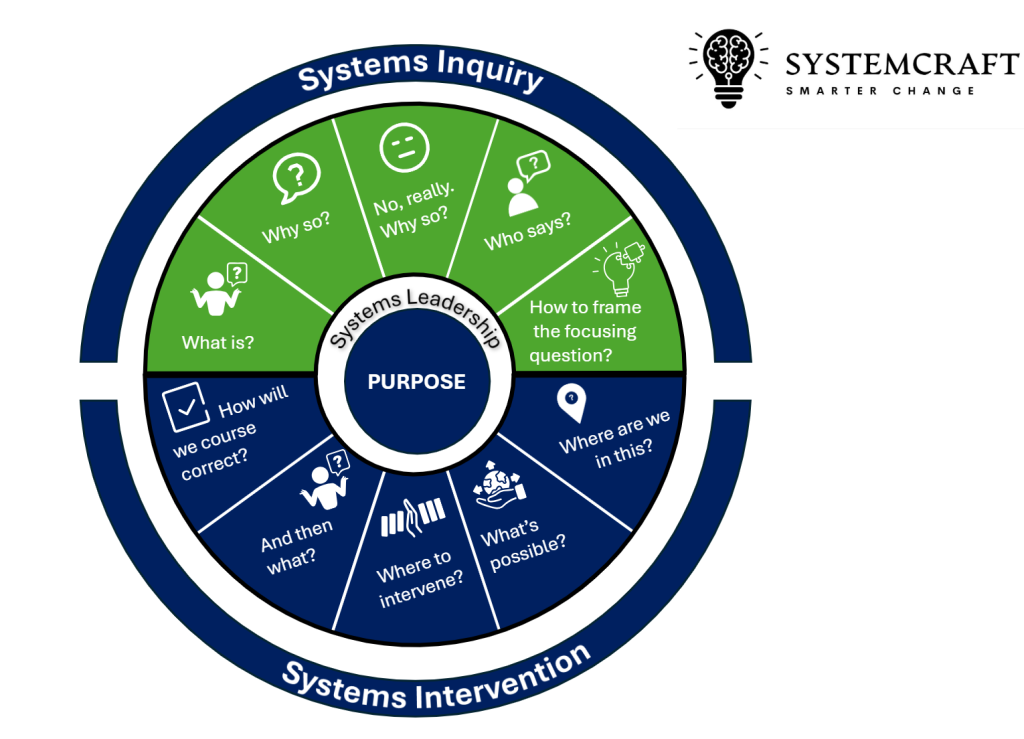12 Implications, Reflections and Opportunity to Check your Knowledge
Figure 9. Systemcraft. Systems Inquiry (Joyner, 2025)
This module introduced the Systems Inquiry process and outlined its core components: What is? Why so? No, really, why so? Who says? and How to frame the focusing question? We stepped through the purpose, concepts and tools for each element. Collectively they structure a rigorous approach to investigating systems. Below is a distillation of systems wisdom from this Systemcraft journey, some reflection questions for your personal growth and some quiz questions to check your learning.
Implications for Leaders and Managers
- Considering the scope and nature of a problem can be done thoughtfully to avoid misdiagnosis.
- Leaders must cultivate the ability to question dominant narratives and uncover deeper systemic drivers to avoid superficial solutions.
- Decision-making should integrate multiple perspectives to mitigate blind spots and biases in systems understanding.
- Systemic change efforts must be guided by well-crafted focusing questions that open up new possibilities rather than reinforcing existing assumptions.
- Leaders should foster a culture of epistemic humility, acknowledging that knowledge is partial and must be continuously refined through inquiry and reflection.
Exercise – Reflective Questions
Reflective Questions for Leaders and Managers.
Bring to mind an organisational issue with which you are familiar as you consider the following:
- Is this problem ordered (simple or complicated) complex or chaotic? Why?
- What dominant narratives shaped the organisation’s understanding of key challenges, and how might they obscure deeper systemic causes?
- Where have I accepted a first plausible explanation without fully interrogating underlying structures and incentives?
- Whose perspectives were missing from my systems analysis, and how can I incorporate a more diverse range of insights?
- If we were to go back now and craft a focusing questions that challenged assumptions and generated more insightful and actionable inquiry, what would it be?
Exercise – Check Your Knowledge of Systems Inquiry
- What is the primary purpose of defining What is? in systems inquiry?
- How does the Cynefin model assist in understanding system complexity?
- Why is it important to challenge dominant narratives when investigating systems?
- Provide an example of how a surface-level explanation might obscure deeper structural causes.
- What are some common incentives or power dynamics that influence systemic issues?
- How does considering Who says? improve the quality of systems analysis?
- Why is epistemic humility important when conducting systems inquiry?
- What are the key attributes of a well-crafted focusing question in Systems Inquiry?
- How can leaders use systems inquiry to avoid implementing superficial solutions?
- In your own context, how might you apply the principles of Systems Inquiry to a current challenge?
REFERENCES
- Joyner, K. (2025) Systems thinking for leaders. A practical guide to engaging with complex problems. Queensland University of Technology. https://qut.pressbooks.pub/systemcraft-systems-thinking/
Relates to the study of knowledge—its nature, sources, limits, and validity


